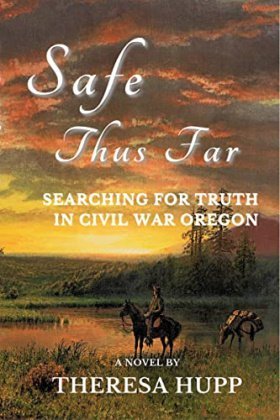“I don’t know what to say to him,” Jenny said.
“I’ll talk to him,” Mac stated, his mouth set in a thin line. “And to Maria.”

Mac stormed down the hall to Will’s room and threw open the door. Will lay on his bed with a book in hand. The boy dropped the book and shot to his feet. “Sir?”
Mac slammed the door behind him. This conversation needed to stay between the two of them. He didn’t want the entire house in an uproar.
“Jenny says you kissed Maria.”
Will blushed a deep red and stared at the floor.
“Why in the hell did you do such a thing?” Mac wanted to hit something. Not the boy, but something.
“She looked pretty,” Will muttered. “She’d done me a favor. I don’t know. I just wanted to.” By the end of his little speech, Will glared at Mac with his chin thrust out, like Jenny did when she was mad.
“She’s your sister,” Mac hissed.
“No, she’s not,” Will shot back. “She’s not your daughter, I’m not your son, and she’s not my sister.”
Mac stood dumbfounded. He couldn’t deny the boy’s statements. He managed to choke out, “In this household, she is your sister. In this household, you are my son. In this household, you will not behave so rashly again. Do you understand me, Will?”
Will’s jaw clenched. He looked mutinous. But finally, he nodded.

Will plodded downstairs for supper but barely picked at his food. Every time he glanced at Mac, his stomach churned. And looking at Mama wasn’t much better. They hated him. All because he’d kissed a pretty girl.
Maria wasn’t his sister. Why shouldn’t he kiss her? Other girls wanted him to kiss them. Cordelia Abercrombie had caught him under the mistletoe last Christmas and pecked him on the lips. Meg Bingham stared at him whenever they were together. He’d danced with her once, and she’d blushed the whole time.
Maria was nicer than either Cordelia or Meg. Why shouldn’t he kiss her?
Will looked over at Maria. Her cheeks turned pink when he caught her eye, then she smiled softly. He’d like to kiss her again, he realized. And take more time at it. Would he ever get to try again? Not if Mac had a say in it.
Will hid in his room after supper. How was he going to live in this house until he left for Harvard in the fall? If that’s what he did.
Chapter 19: Growing Pains
Before dawn, while everyone in the house was still asleep, Will crept out to the carriage house. He’d barely dozed all night. After reading Mama’s and Mac’s journals, after the argument with Pa over Maria, he couldn’t relax. He needed to get away. Despite his promise to stay with Mama, he was too restless to sit at home. Let Mac stay with Mama for a day. Why should Will be responsible?
Shanty and Valiente and the carriage horses all whinnied at the interruption, but he quieted them with oats while he saddled Shanty. He’d ride out to Jonah’s house. If he left now, he’d get there about the time the Abercrombie family began their day.
The cold air nipped at his ears, but the rising sun promised better weather as the day wore on. Will hunched low over Shanty’s neck and urged the gelding faster. Shanty tossed his head, but obeyed Will’s nudges.
As Will expected, Daniel and Jonah were doing morning chores in the barn when he arrived.
“You’re here early,” Daniel said. “Come to spend the full day with us?”
“I hope to,” Will said. “What do you have planned?”
“Tilling the last of the cornfields,” Daniel said. “Ground’s warm enough to pull a plow through now.”
“Morning, Jonah,” Will said to his friend, who grunted in response. Jonah in a churlish mood would make for an unpleasant day. Maybe Will would leave at noon.
But he was so glad to be away from his own home that he tried to be friendly to the other Abercrombies. He cheerfully offered to help Esther, flipping pancakes for her brood while she fried bacon. After they all ate, Daniel ushered Will, Jonah, and Sammy out to the fields.
The sun came out by midmorning, and the wind gentled. Will was still glad for his coat and gloves, but he was comfortable laboring under the bright sky. He willingly agreed to guide the plow behind the mules while Jonah took the easier place by their heads. Across the field, Daniel and Sammy worked with the other mule team.
Daniel’s daughters Cordelia and Abby brought food to them at noon. The men and girls all sat on a flat piece of ground in the sunshine.
“Where’s Esther?” Jonah asked, as he dug into the plate of stew Cordelia handed him.
“Abe is fractious,” Cordelia replied. “Ma didn’t want to leave him. But me’n Abby was glad to get out of the house.”
Will grinned. “I don’t blame you.”
Cordelia smiled back at him coyly, batting her eyes.
Will groaned inside. He hadn’t intended to encourage Cordelia’s flirting.
While Will talked to Cordelia, Jonah and Daniel got into an argument. Will didn’t hear what started it, but he heard Jonah yell, “You treat me like Abe. Like one of your young’uns. Don’t you trust me to do a man’s work?”
“Not when you throw tantrums like Abe—” Daniel began.
“Damn it, Daniel,” Jonah shouted, “I—”

























